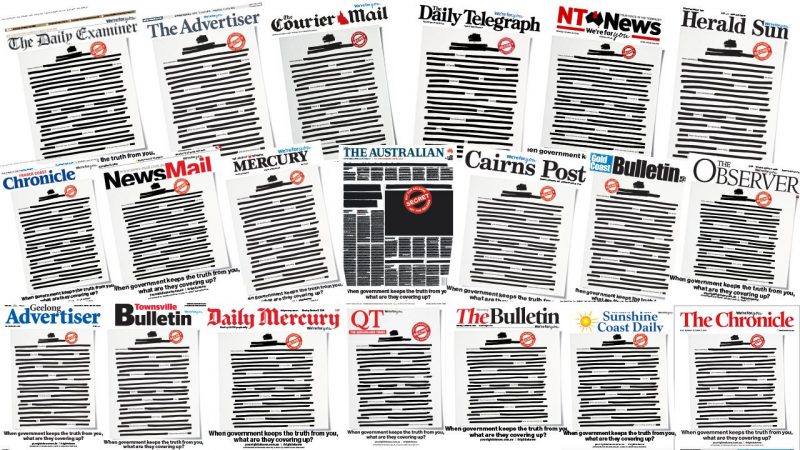Newspapers unite with redacted front covers for first time because Australians have a ‘right to know’ about government secrecy
Australian newspapers all look the same today – completely redacted. This unprecedented and united act of self-censorship from rival publishers calls attention to eroding press freedom and how governments can cover up stories to keep the truth from the public.
The front pages of newspapers from every major media company, including The Australian, The Sydney Morning Herald, and The Daily Telegraph, are redacted to remind Australians that they have a ‘right to know’, following Australian Federal Police raids on News Corp journalist Annika Smethurst and the ABC’s headquarters earlier this year.
Both The Daily Telegraph and ABC are awaiting the outcome of the raids, including a decision as to whether targeted journalists will be prosecuted. 75 laws related to secrecy and spying have been passed over the passed two decades, which journalists argue are serving to criminalise their craft and penalise whistleblowing.

Today’s front pages


General secrecy rule:
Secrecy = your money in my pocket
One of the most important issues we face. Government regulation of media as we currently have it is broken. Already the PM is pushing back. We do not live in a secret or police state, but that’s where we are starting to head. A loud voice of protest is required.
I love it. This restores much of my lost trust in journalists and newspapers.
My personal opinion of the government’s interxxxx is XXXXX XX
xxxxxx xxxxx xx x xxxxxxxxx xxx xxxxxxxx xxx xxxxxxxx x xxxx xxx xxx.
This is collusion with which I agree. Just the withholding of information by governments at Federal, State and Local levels with the excuses of “Cabinet in Confidence” and “Commercial in Confidence” is bad enough. They spout “transparency” while sweeping all non-corroborating facts under their respective carpets. We need as many tools as possible to hold self-interest legislators to account. Media freedom is essential to these processes.
The issue of government suppressing freedom of speech, media freedom and the right to know is a highly valid one especially in the era of right-wing populism.
But big business and high-profile individuals can also be engaging in suppressing media freedom and the right to know. This can be in the form of defamation lawsuits and using all sorts of restraining orders to proscribe the publication of material that should be available for the public, especially key stakeholders.
What needs to happen is that the campaign extends to judicial and business practices when it comes to the dealings regarding big business and individuals who are in the public eye.
This argument would be so much better if people who call themselves journalists had a track record of providing “the truth”. So much of what is written today is one-sided, alarmist nonsense and/or gossip and as a result today’s so-called journalists are considered no better than the people this seeks to call out. To mix metaphors, put your own house in order before seeking assistance to help throw stones at others.
Agree 100% with this.
Agree with you much more than usual on this.
Journalism needs protecting from government suppression, but it equally needs protecting from owner suppression.
Bit ironic since none of those mastheads support Julian Assange or even write about him anymore.
That’s because Assange is not a journalist. Duh!
What then, makes someone a journalist in the eyes of the law?
I like the idea. I like the execution.
But why not go the whole hog and just not report any of the government’s PR drivel. After all they did accidentally send it to the media recently.
A decent journalist shouldn’t be regurgitating what Canberra wants.
As an example, get on the front foot with some of the usual ‘headline grabbers’.
Let’s start with “we’ve created a million jobs over the past ‘x’ years”. Append to that the population growth over the same period of time, how much was due to immigration and porous visa activity, then report the proportion of the working-age population that is employed – full-time and part-time. Then you would get a true and full picture that our jobs growth is primarily due to record immigration levels, rather than the government ‘creating jobs’ when they are reducing government expenditure in labour-based areas.
It’s an ironic fact that advertising is a cornerstone of a strong democracy. The more advertising there is the more news that can get reported. It would be great to see advertisers and media agencies show their support for press freedoms.